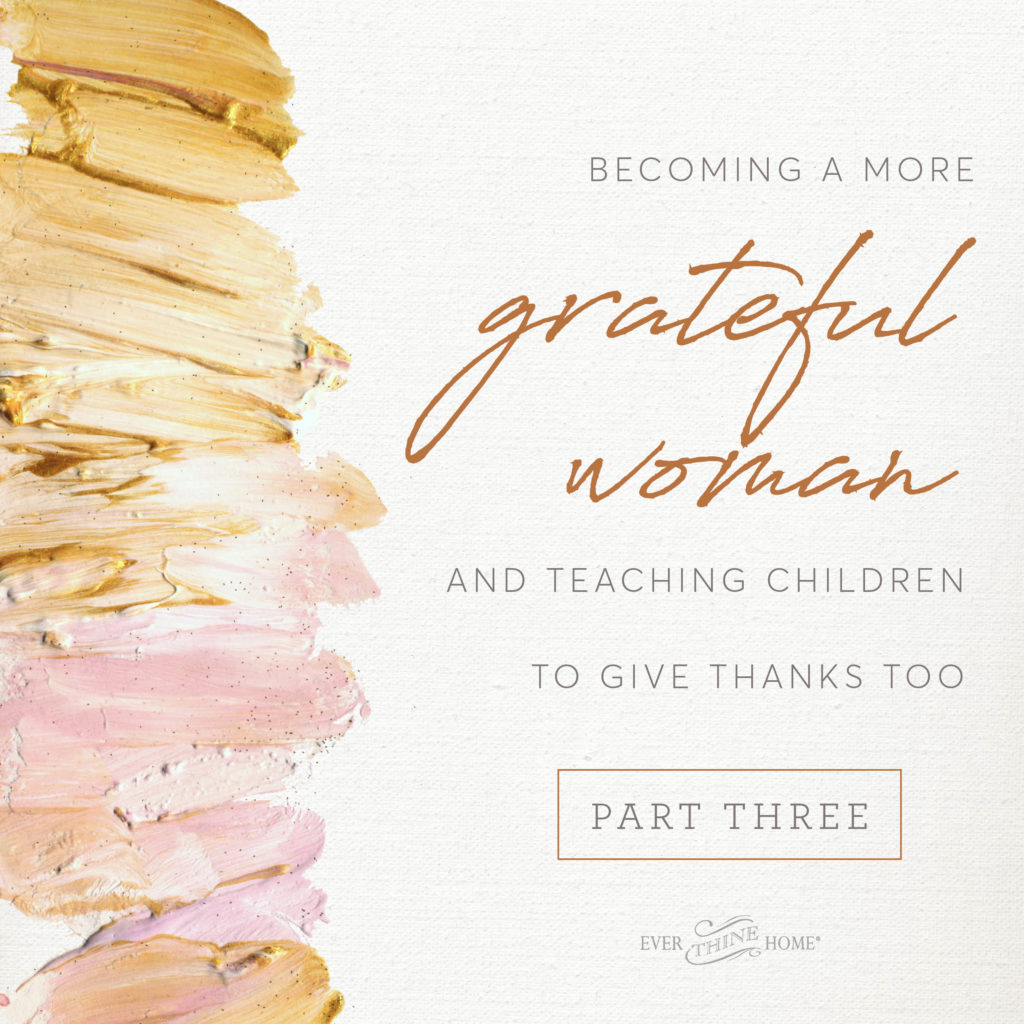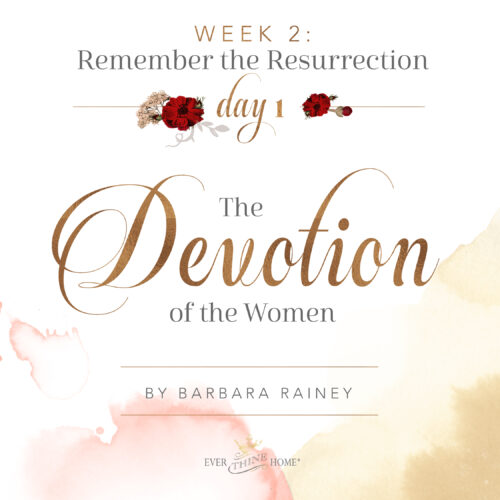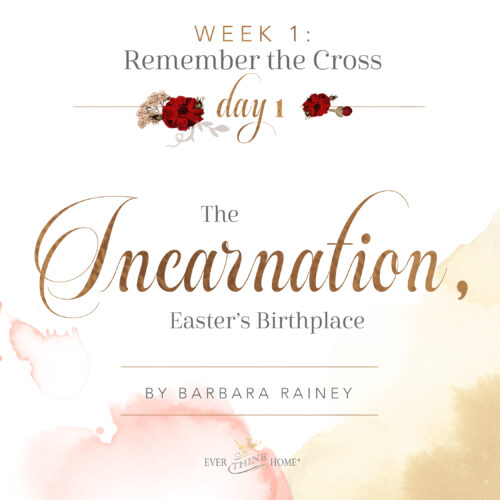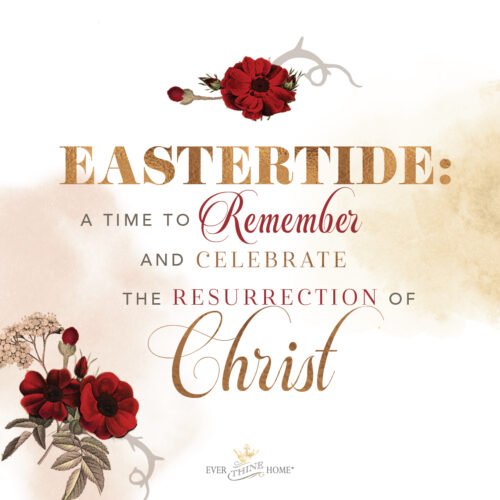
It’s obvious to every mom, every teacher, every grandparent that gratitude is not natural in children. It is an attitude that must be modeled, taught, and nurtured. Our family’s travels to impoverished places in other countries glaringly revealed our lack of gratitude for all we have in the United States. Prosperity breeds entitlement not thanksgiving.
The honest truth is kids aren’t the only ones who have a problem with ungratefulness and complaining. I too do not always “give thanks in all circumstances,” (1 Thessalonians 5:18). You too?
No matter your age, to cultivate gratitude you must choose to express thanksgiving. To step out of your natural bent toward selfishness and focus on somebody else is the essence of thanksgiving and gratitude. For us, as believers, it’s also directing our thanksgiving and gratitude toward the source of all we enjoy in life, which is God Himself.
Growing a heart which says “thank You, God,” and teaching children to express the same is essential for a life of surrender to Christ. To have grateful children means I have to be a grateful woman.
If you missed the previous stories on gratitude, click here to read part 1 and part 2…
William Bradford, the governor of Plymouth Colony in New England, suffered great loss in his childhood. When he was sixteen months old, his father died; he never knew the man for whom he was named. At the age of four, after his mother remarried, young William was sent away to live with his grandfather. Two years later, his grandfather died and he returned to live with his mother and stepfather. The greatest loss of his young life occurred a year later when his mother also died.
(If you are reading this to children, ask them to tell how they would feel if they were William.)
The Bible tells us that God “will neither slumber nor sleep” (Psalm 121:4), so we must believe that He was fully aware of all that was going on in young William’s life. What was God doing? Why did He allow such pain to fall on one so young and alone?
After being moved to his fourth home in seven years, William found himself living with two uncles in another village in England. They were delighted to have him as another worker for their farm. However, William’s trials were not over. He soon became sick and did not recover quickly.
In his long illness we finally see a glimmer of hope that God was indeed in control. Because William was unable to do manual labor, he was allowed to learn to read and write—skills that very few commoners were able to acquire in the 1600s. William likely received his education from a local minister.
Though his sickness left him frail and weak, by the age of twelve he had read many books from the pastor’s library, which of course included the Bible and books such as Foxe’s Book of Martyrs. God’s providence—that He was providing William’s training and preparing him for his future—is clear to us now, though it was not so obvious at the time.
William’s Bible reading drew him to God but also left him with questions. As a teenager, he was invited by a friend to attend another church in a nearby town. It was, however, a church that was viewed as opposing the Queen of England and was therefore controversial. This church believed in teaching the true Word of God as man’s authority.
In spite of his uncles’ strong objections, William chose to walk many miles each Sunday to attend this church. There he met Mr. Brewster who mentored him in the faith and became like a father to him. Years later in 1620, Mr. Brewster joined William Bradford on the journey to the new world aboard the Mayflower.
God allowed William Bradford to endure a life of trial because in His providence God was preparing William for his future calling. That calling included leading the colonists of Plymouth as they journeyed over the Atlantic to the new world and then serving as their governor for over thirty years.
Jeremiah 29:11 reads, “I know the plans that I have for you.” God wanted William to learn to read and write, to learn to think and pray, so he could follow in the path God had prepared beforehand.
Here is a prayer like the ones prayed by William Bradford and the Puritans who sailed on the Mayflower. Some of the words sound different from those we use in our prayers today, but sometimes it is good to pray using words written by someone else. This helps us think about God in different terms.
A PURITAN PRAYER
Heavenly Father,
I believe thee,
I accept thy Word,
I submit to thy will,
I rely on thy promises,
I trust thy providence.
Thy providence has set the bounds of my habitation,
and wisely administers all my affairs.
Help me to see Your providence in all that concerns me
And may I ever give you thanks.
Amen.[i]
Providence has been described as “the evidence that God has not left this planet alone in the vast universe or forgotten for a moment the human situation. God visits, touches, communicates, controls, and intervenes, coming before and between man and his needs. Providence is the basis for thankfulness.”[ii]
Can you believe that God is providentially working in your life and your circumstances?Give thanks today for what God has allowed in your life that may not make sense to you now. He is not asleep. He has a plan for your life. Will you choose to believe that He is at work?





This is amazing! Just what I needed to hear. It amazes me just how God works in everything and to watch how things unfold. Thank you so much for sharing this.
It is beautiful to be reminded about gratitude. For this I am thankful. And I look for ways to teach and model this to my children. Myself, I was a child when Joni’s story came out and I definitely heard the, “ be grateful you can walk, move, etc” , lesson. But how this was presented to me was ever so damaging, just like the “way your broccoli and be glad your not starving like children in Africa”. There must be better ways to model gratefulness than comparing to someone who has suffering. Teaching gratefulness within suffering is ever so valuable, and slippery to teach , at least for me. I often am reminded to teach gratefulness in the face of its opposite—instead of prempting with grace.
THANK YOU! What a great series! I so enjoyed each story, especially Joni’s story. What a priceless gift we have in Joni Eareckson Tada. She makes my heart cry out to the Lord for forgiveness for complaining and thanksgiving also.
Happy Thanksgiving to you and yours, Barbara.
What a wonderful Thanksgiving Day devotion! Thank you, Barbara. Yes, GOD is Good….All the time! Being as I am now in my seventies, I regret that it took me many of those years to “mature” as it were, in God”s Word also. How marvelous are His Works and I pray each day that I will never forget that
regardless of what may come, in my life….and especially, in our grandchildren’s and children’s life. I will read this again, and hope to incorparate it as our families gather on Thanksgiving Day. There will be those there that really need to hear. Thank you again! Happy Thanksgiving!
My husband was actually named after William Bradford. His family comes from a long line of Mayflower descendants. He has come to know Jesus and follow him daily and lead our family with humility, grace and love for all.
I prayed for many years that his heart would open to the hand of God’s will and I am so blessed to call him my friend, partner and husband. Thank you for the reminder. Happy Thanksgiving!!